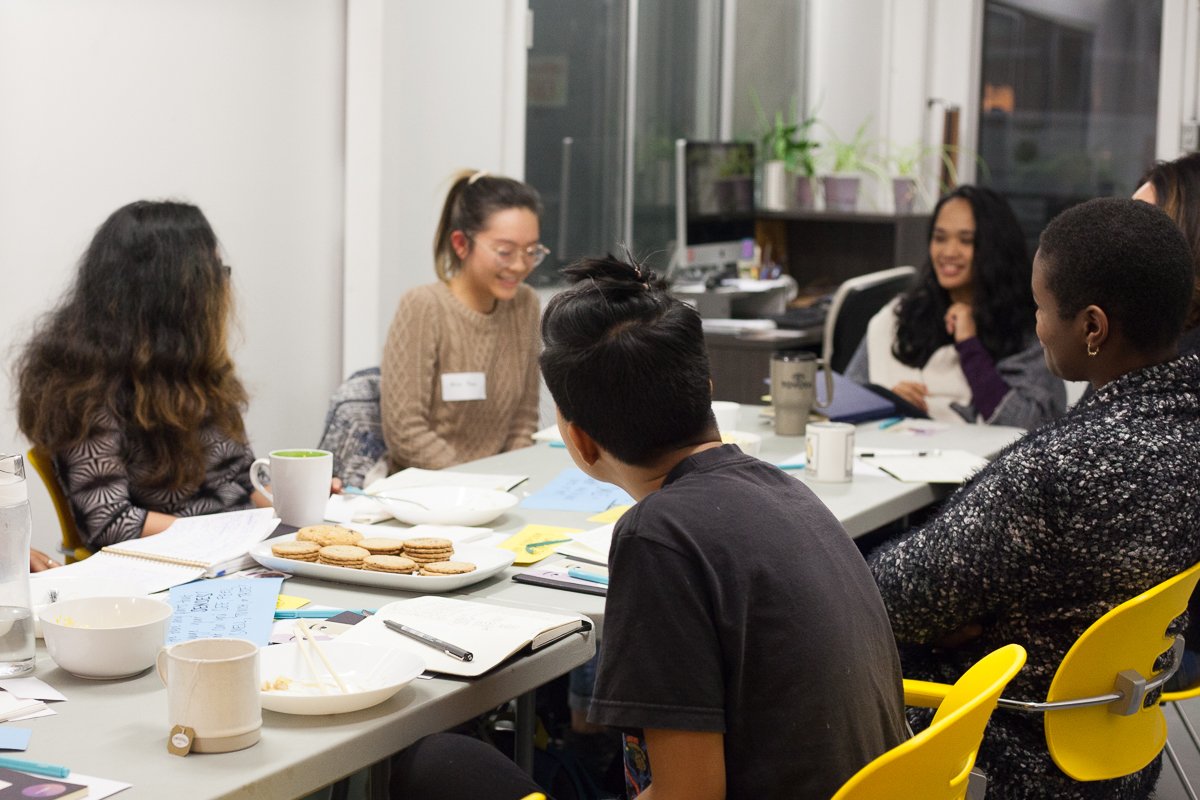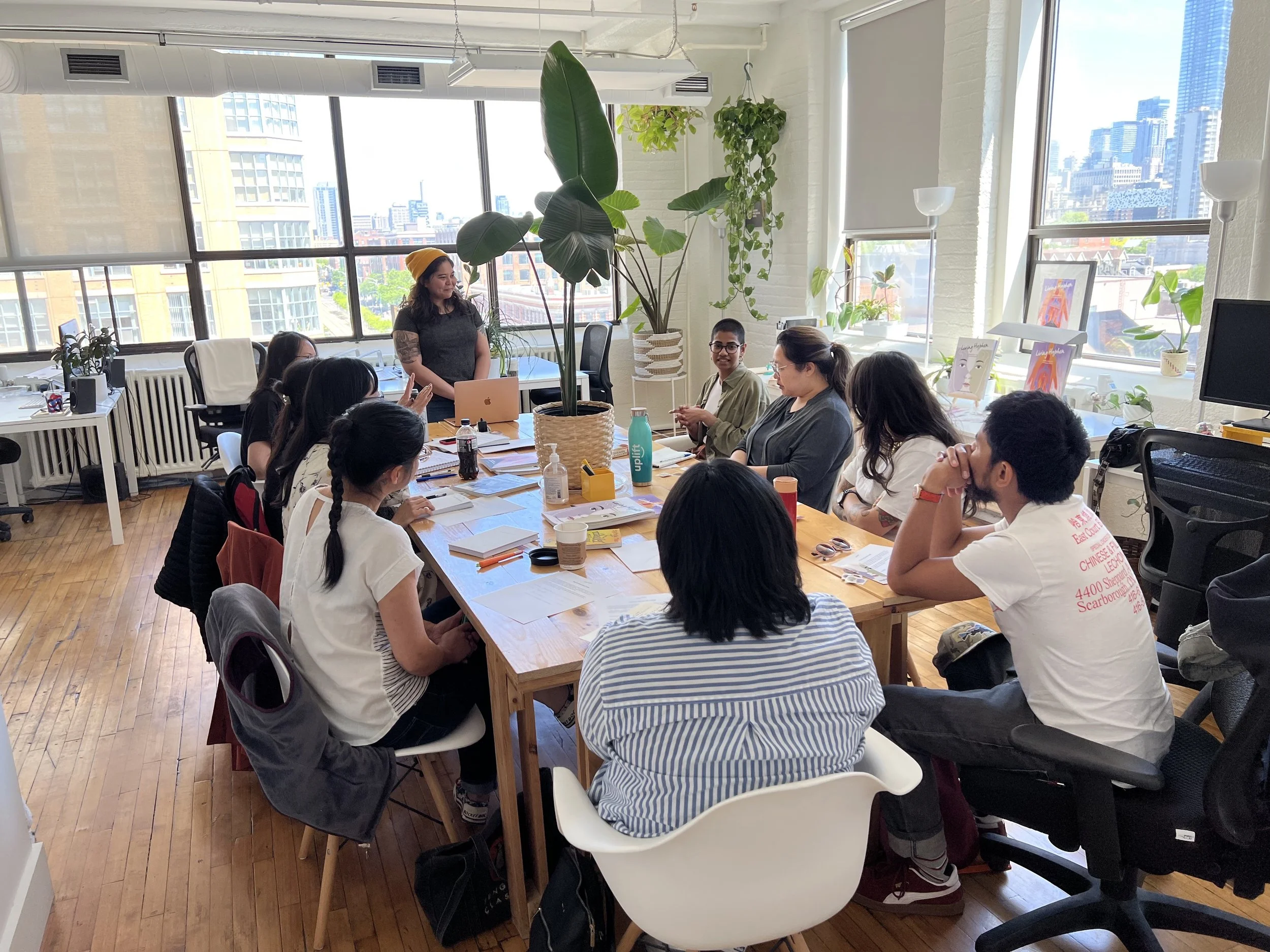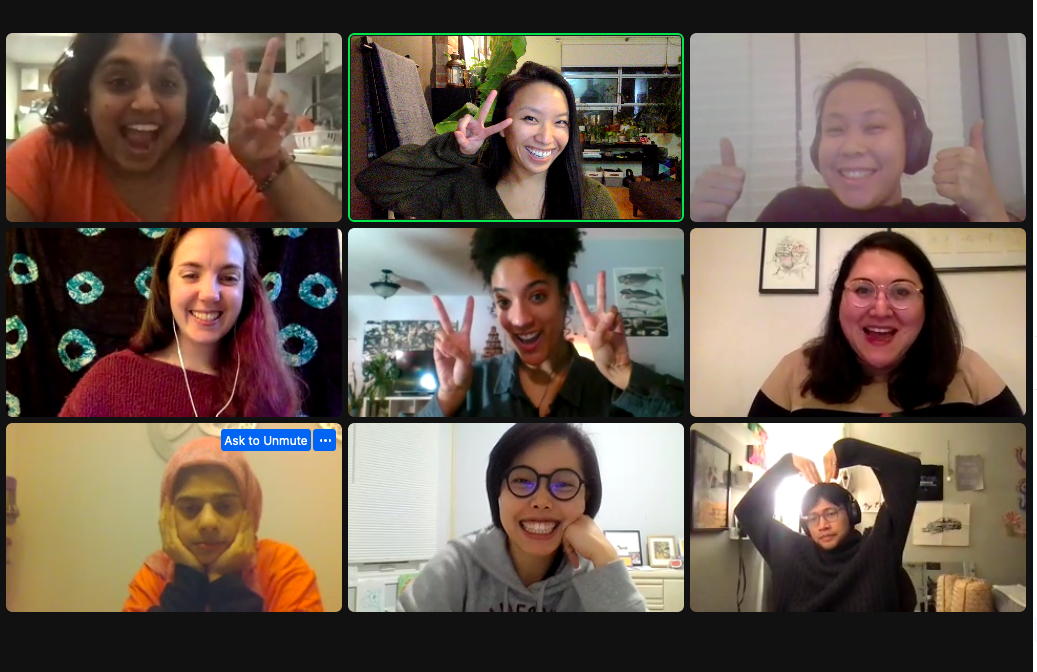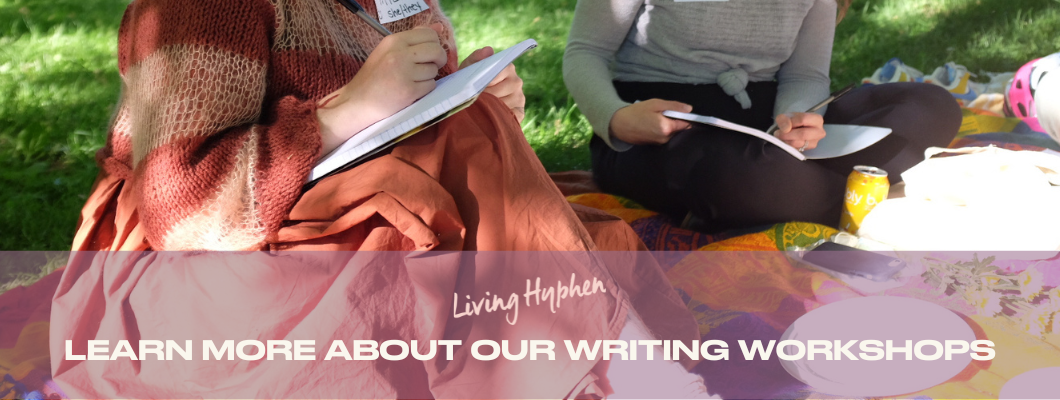For those of you who have been following Living Hyphen’s journey, you know that over the last few years, our writing workshops have become one of our core offerings for our community. In fact, since we started delivering cultural programs back in the fall of 2019, we’ve organized and facilitated nearly 120 workshops with over 1400 people!
While originally exclusively a print publication to spotlight the voices and stories of those who have been historically excluded from mainstream media, Living Hyphen quickly expanded its mandate to include cultural programming after recognizing that the conversations around representation simply did not go far or deep enough.
After successfully launching the inaugural issue of our magazine, many Indigenous, Black, and people of colour reached out to me personally to express how seen they felt while reading the stories in our pages. They shared with me the shame, the discomfort, the timidity, and the doubt that they felt in sharing their lived experiences. We talked at length about the many ways in which we have had to quiet, change, and outright silence essential parts of ourselves to fit into the mold we see in media.
It was then that I realized that putting a Black or brown face on screen won’t change the narrative if the actual script is the same. So yes, while representation is necessary and urgent, what we really need is programming, resources, funding, and mentorship to actually cultivate and nurture the diverse storytellers that create the stories, the books, and the scripts that shape our culture.
As I’ve written previously, Black, Indigenous, and people of colour have been told from their earliest days by the institutions and influences around them that their stories don’t matter, that their stories are not worth listening to, are not valid, are not Canadian enough, are not X ethnicity enough. And so those stories are left not only unheard, they are left entirely untold.
This is at the core of why I decided to double down on Living Hyphen’s cultural programming, especially during this time of pandemic when inequities have only deepened and intensified everywhere.
These writing workshops are our way of actively and tenderly cultivating, nurturing, and mentoring racialized writers — many of whom come into our workshops highly reluctant to even call themselves that.
These writing workshops are, for me, the most radical thing we do at Living Hyphen. Radical, of course (though it shouldn’t be), because of the voices that we prioritize, but even more radical because of our approach and pedagogy.
Photo by Kristina Corre
Before I get into it though, let me be clear that our approach is not original. It has been informed by great thinkers, educators, and practitioners like bell hooks, Audre Lorde, Paulo Freire, David Mura, Austin Kleon, Lynda Barry, and Felicia Rose Chavez, among many others.
*I’ll include a list at the end of this post of all the books and writers who have influenced and inspired our work in hopes that you carry their wisdom forward in your work too!
Writing to Let Go of “Perfection”
At the beginning of every workshop, I always ask the writers in the room to refrain as much as possible from editing their work during our time together. I urge them to fight against the impulse to correct, filter, or polish their work. We don’t care about spelling mistakes, and we especially do not care for (or believe in) “correct” grammar or “proper” sentence structure. So much of that is steeped in colonial ways of thinking and we reject that. What matters to us instead is the impulse, the energy, and the feeling of the story.
Felicia Rose Chavez of The Anti-Racist Writing Workshop explains it beautifully:
“It’s important that my workshop participants demonstrate confidence first and technical proficiency second. Writing is a relationship with the self, after all. It’s a ritual of tuning in and listening to the language inside of us. Those words are power. Power to make sense of ourselves, by ourselves, independent of the system of white supremacy that tells people of color that we have no dignity, no history, no art, no voice.
Confidence says, “I exist; you cannot erase me.”
But relinquishing control, fighting the censor inside of us, and crushing the colonial mentality is harder than you would think. And so for that, there is a writing exercise that I’ve borrowed from Filipina-American cartoonist Lynda Barry that I so often love to share. It goes a little something like this:
I’m going to say a word and I want you to write down 5–10 memories associated with that word.
Your word is “FLOWER” (or car, telephone, plane…anything really)
Write down at least 5 -10 memories that you associate with that word. Keywords or bullet points are fine!
Look at your list and pick one that you feel the most connected to today, one that you feel the most strongly about right now.
Start a fresh new page and write down that memory at the top as if it’s the title of your story.
Now…draw a big X right across your entire page.
At this point, people will stop and stare at me in disbelief. Some will gasp. Some will ask for clarification on this last step: “What do you mean across my entire page?”
And then I will demonstrate for them. I will draw, just as I said, a giant X across my entirely new and fresh and beautifully empty page.
People will giggle, look at me skeptically, continue to look mortified, and then go on to draw that giant X.
The point of this exercise is to encourage writers to immediately let go of any expectations of perfection during our time together. Oftentimes, when we sit down to write, it feels so daunting because we expect to write the next bestseller, the next viral think piece, or the next timeless poem.
I know because I’m guilty of it myself.
We live in a hyper-capitalist society that puts so much emphasis on perfection, excellence, and productivity. There is so much pressure to produce something that is immediately perfect, that is ready for public consumption and praise that all the joy is sucked out of writing.
I love this writing prompt because drawing that simple X becomes a radically liberating act. “Ruining” our pristine page suddenly gives us the opportunity to breathe, leaves us room to get messy, to let go of any expectations of how our writing might take shape, and to simply…have fun!
After they’ve drawn that big X across their page, I then ask a series of rapid questions challenging each writer to really put themselves back into that memory. I urge them to write bullet points or short phrases, anything that will jog their memory further. And I encourage them to write all over their X page. Sideways, upside down, doodle and draw, wherever and however their pen decides to go.
Where are you? What time of day or night does it seem to be? What season is it? Where is the light coming from? Is there light? What kind of light is it? What’s the temperature like? What does the air smell like? What are you doing? Is there anyone else in this memory with you? Who are they? What is your relationship? What are they doing? Why are you there? And so on and so forth…
All too often our writing stops before we’ve even begun because we get hung up on these ideas of perfection — that is, arbitrary standards that were set by…who, anyway? We obsess over the exact first words we should jot down as if it’s the be-all and end-all of our writing lives. We become so paralyzed that we can’t even bring our pen to paper or our fingertips to the keyboard. The point of this exercise is to just get the words down and just to get started, to get our pens and our fingers moving.
As Lynda Barry wisely tells us, “We know that athletes, musicians, and actors all have to practice, rehearse, repeat things until it gets into the body, the muscle memory, but for some reason, writers and artists think they have to be inspired before they make something. Not suspecting that the physical act of writing or drawing is what brings that inspiration about.”
Writing as Process, Not Product
Or to put it in a cliché: it’s the journey, not the destination.
At Living Hyphen, we focus not so much on the finished product of our writing, but in the joyful, healing, and nourishing process of it. Real writing, as Chavez puts it, “[is] the pursuit of authentic voice through process, not product.”
In our hyper-capitalist society, there is so much focus on the end product. We glorify “the grind” turning everything we do into a “side hustle”. We must find a way to monetize every hobby, every project, and everything that we do. We must make it beautiful and Instagrammable. This mentality is harmful for so many reasons but most of all because of the distorted and toxic ideas of self-worth (or lack thereof) it creates.
One of the first writing workshops I ever attended in my adult life was through Firefly Creative Writing, and their style, approach, and values have greatly influenced much of how we run our writing workshops at Living Hyphen. As my friend and Firefly’s founder, Chris Fraser, once wrote in her newsletter:
A lot of people come to us with massive goals. I want to write a bestseller, I want to write for two hours a day, I want to finish this draft by month’s end…
When I see those goals, I don’t discourage them, but I don’t feed them either. For many of us, those holy grail goals are what finally open the door to the secret creative gardens in our hearts. But once we’re in there and we’re writing and feeling and smelling flowers and experiencing our voices and letting fears fly away with the pollen, the massive goals usually lose their grip. We really just wanted into that room.
That’s what we have been working towards at Living Hyphen too. We’ve been working to cultivate that secret creative garden we never knew existed inside of us and growing it by inviting each other in as a community.
We are dedicated to creating a space where we can revel in our messy pages. We happily stumble into accidents that lead us to stories we didn’t realize we wanted and needed to tell. We bear witness to each other’s stories because as bell hooks says, “to hear each other (the sound of different voices), to listen to one another, is an exercise in recognition.” We play with our words in a world that tells us there isn’t time for that. We allow ourselves to simply write.
Writing as Embodied Practice
Writing is often considered an intellectual practice. And of course, it is. But at Living Hyphen we prefer a much more holistic approach to our writing — one that brings our mind and body together and does not compartmentalize the two as separate entities.
For us, writing is as much an intellectual endeavour as it is an embodied practice. We must engage our bodies in the process of writing to fully allow our creativity to flow.
Recently, I’ve started to kick off each of my virtual writing workshops with a quick ice breaker that I’ve borrowed from my friends Linh S. Nguyen and Christie Wong who are also fantastic writing/art facilitators and educators. After a round of introductions, I ask everyone to get up out of their seats and move away from their camera so that they are outside of their little Zoom boxes. I then give them a prompt of a facial expression or action that they need to embody when they re-enter their screens on my count of three…
Show me your face when you’ve won the lottery. Pretend you’re eating your favourite fruit. What does annoyance look like? Show me your favourite dance move!
We laugh. We hesitantly follow along. We gesture awkwardly. We give our best performance. We move our bodies.
And in that seemingly silly game, we break down an important barrier and let loose.
Our workshops are not places to sit still.
As I slowly move back into more in-person settings, I leave out play-doh in the middle of our table so folks can play. I encourage our writers to take big, loud, and spacious stretches. I invite them to breathe with me before moving into another prompt. I ask them to grab a snack or a beverage, and enjoy it. I tell them to sit wherever and however they feel the most comfortable.
As Austin Kleon advises, “You need to find a way to bring your body into your work. Our nerves aren't a one-way street — our bodies can tell our brains as much as our brains tell our bodies. If we start going through the motions, if we strum a guitar, or shuffle sticky notes around a conference table, or start kneading clay, the motion kickstarts our brain into thinking.”
Movement is what facilitates that creative flow. The act of engaging our bodies and tapping into its wisdom is made even more necessary for those of us who identify as racialized writers. Our bodies hold and carry so much of the stories that are within us and that have been passed down across generations. Cherríe Moraga puts it best when she writes:
“The very act of writing then, conjuring/coming to ‘see’, what has yet to be recorded in history is to bring into consciousness what only the body knows to be true. The body — that site which houses the intuitive, the unspoken, the viscera of our being …”
Photo by Anna Balagtas
Writing to Heal; Writing to Find Joy
I’ve always kept a journal ever since I could remember. Every single night, I would jump into bed and before turning the lights out, I would write in these pocket-sized notebooks that I would buy in bulk at the dollar store.
I would write about school and my friends and all the shenanigans we would get up to. I would write about all my crushes that formed into romances that dwindled into heartbreak. I would write about my dreams and my goals and all the things I wanted for myself. I would write about my relationship with my parents and all the beautiful complications that were bound up between us. I would write about my travels, the new ways I was seeing the world. I would write stories, poetry, and little strings of words that I thought sounded pretty together.
I’d jot down everything and anything — from the most life-changing transitions and events to the most mundane details of my everyday life.
Writing got me through my saddest days, my heartbreaks, and my growing pains. Writing also held my happiest, most triumphant moments.
Writing was/is my way of healing. Writing was/is my way of finding joy.
That’s what I want for each and every one of the writers that come through our doors at Living Hyphen.
I always tell the writers who join us in our workshops that 98% of my writing will never see the light of day. They will be kept in my small dollar-store journals stacked in boxes under my bed and in the back of my closet.
My writing is for me. And that is more than enough.
I think we are well advised to keep on nodding terms with the people we used to be, whether we find them attractive company or not. Otherwise they turn up unannounced and surprise us, come hammering on the mind’s door at 4 a.m. of a bad night and demand to know who deserted them, who betrayed them, who is going to make amends. We forget all too soon the things we thought we could never forget. We forget the loves and the betrayals alike, forget what we whispered and what we screamed, forget who we were. […] It is a good idea, then, to keep in touch, and I suppose that keeping in touch is what [writing is] all about.” — Joan Didion
Learn more about and register for Living Hyphen’s writing workshops.
Our Teachers in Pedagogy
The following are books, writers, and creatives who have influenced and inspired our work. We hope that you carry their wisdom forward in your work too.
Teaching to Transgress by bell hooks
The Anti-Racist Writing Workshop by Felicia Rose Chavez
This Bridge Called My Back: Writings by Radical Women of Color by Cherríe Moraga
A Stranger’s Journey: Race, Identity, and Narrative Craft in Writing by David Mura
Steal Like An Artist by Austin Kleon
Sister Outsider by Audre Lorde
Pedagogy of the Oppressed by Paulo Freire







